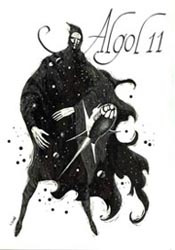Algol
Algo was a science fiction fanzine by Andrew Porter.
Released in New York, U.S.A. in 1963 Algol grew from a two page fanzine created on a spirit duplicator to having offset covers, and then mimeographed pages, till it eventually became a printed publication with colour covers with a circulation of 7,000. The name of the fanzine was later to changed to Starship and at this time it became a pro zine.
Contributing writers included Brian W. Aldiss, Poul Anderson, Douglas Barbour, Gregory Benford (Void), Anne McCaffrey, A. Bertrum Chandler, Philip K. Dick, Vincent DiFate, Harlan Ellison (Science Fantasy Bulletin), Walter H. Gillings, Ursula K. LeGuin, Richard Lupoff (Xero, Horrib), Sandra Miesel, Frederik Pohl (The International Observer of Science and Science Fiction, Arcturus), Robert Silverberg (Spaceship), Ted White (Void), Jack Williamson, and Susan Wood (Aspidistra, Genre Plat, Amor).
Contributing artists included Terry Austin, Vaughn Bode, Rick Bryant, Grant Canfield, Derek Carter, Ross Chamberlain, Cecilia Cosentini, Lee Elias, Vincent Di Fate, Kelly Freas, Jack Gaughan, Mike Gilbert, C. Lee Healy, Alan Hunter, Tim Kirk, Bill Kunkel (Rats!), Jim McLeod, Lydia Moon, Dan Steffan (Boonfark), Steve Stiles, Mike Streff (Quantum), Bill Rotsler, Jim Steranko, Arthur Thomson (The ATom Anthology), Judith Weiss, and Frank Wilimczyk (Paradox).
Algol also featured interviews with writers such as Suzy McKee Charnas, Samuel R. Delany, Gordon R. Dickson, Ursula K. LeGuin, Fritz Leiber, Richard Lupoff, and Michael Moorcock (A Fanzine Called Eustace, Typo).
Algo won the Hugo Award for Best Fanzine in 1974. Later the category for 'Best Fanzine' would be redefined so that semi-pro zines such as the later Algol/Starship with professional printing and circulations over 1,000, would have their own category, 'Best Semiprozines'. Whatever it ended up as, Algol did start out as a real fanzine.
